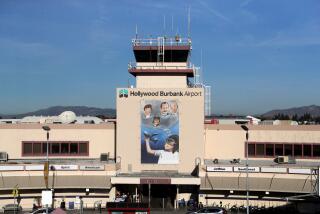Help for Crowded Skies
- Share via
By the end of this decade, it is reliably estimated, at least three dozen of the nation’s largest airports will need some kind of traffic limitation imposed on them by the federal government.
Overcrowding, in an era of deregulation and free entry to the marketplace, is a serious problem or is about to become one in a great many places. Expansion, new technology, upgrading of facilities on the ground and in the control tower are essential.
What’s needed, of course, are massive infusions of cash.
Air travelers though, have already paid for much of the work that needs to be done. The federal government has close to $8 billion in money contributed by air travelers in the form of an 8% tax on domestic tickets.
The last ticket I bought showed the Los Angeles-Denver round-trip fare as $164.82. I paid $178. The other $13.18 went straight into a special trust fund specifically for the purpose of airport development.
Into the Fund
When I went to Seattle, I bought a $155.54 ticket . . . and coughed up $168. The extra $12.44 went into the fund.
Every time you buy a ticket for a domestic airline flight, the carrier or the issuing travel agent has to collect an additional 8% of the price. Over the years, that money has accumulated.
So why are so many questions asked about our air traffic control system? Why are so many airports congested or totally inadequate for the volume of traffic they get?
These are questions Congress is asking.
The problem is that the Office of Management and Budget seems to have forgotten the purpose for which that money was intended and is treating it as it does all other tax revenues, more or less as part of the general fund.
Need at Critical Airports
Sen. Nancy L. Kassebaum (R-Kansas), chairman of the Senate aviation subcommittee, is trying to do something about the continued refusal of the government to release cash from the trust fund to enable improvements to be made at some of the more critical airports.
The legislator has introduced a bill that would remove the trust fund from the government’s unified budget process and make it more accessible to those anxious to get on with airport projects. She has asked the Senate Budget Committee to hold hearings soon.
How long the battle lasts is also a matter of considerable interest to all of us who use airports.
Los Angeles is luckier than some cities. It has an improved airport and new terminals but there is still a lot of work to be done that hasn’t even been budgeted yet. The Los Angeles International Airport of 1990 will be less able to do its job than the 1986 version.
More to Read
Sign up for Essential California
The most important California stories and recommendations in your inbox every morning.
You may occasionally receive promotional content from the Los Angeles Times.













